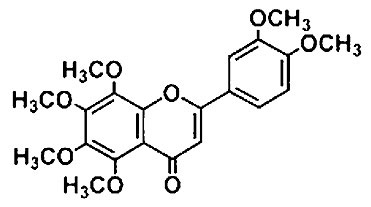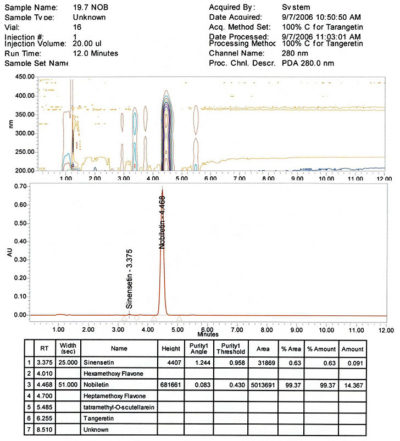A polymethoxylated phytochemical isolated from citrus peel (Citrus sinensis) with anti-inflammatory and anticancer and cholesterol-lowering properties
- Catalog No: APH-06052
- CAS Number: 478-01-3
- Chemical Formula: C21H22O8
- Molecular Weight: 402.40
- Purity: > 99 % CP
- Appearance: White to off-white crystalline solid
- Solubility: Soluble in methanol
- Stability: Stable as a solid over extended period at -20ºC.
- Storage: Store at -20ºC
- Shipping: On ice (5ºC)
- Handling: Avoid exposure to oxygen and direct sunlight.
Source:
Nobiletin is a nonpolar polymethoxylated flavone (PMFs) found in the citrus peel of various fruits, such as tangerine. Its chemical structure is similar to tangeretin, containing the typical flavonoid structure and six methoxyl groups (one more than tangeretin).
Biological Activity:
Citrus fruit-derived flavonoid s have been shown to have significant biological activity, including anticancer (Luo et al., 2008), anti-inflammatory and antiatherogenic properties (Whitman et al., 2005). Kurowska and Manthey (2004) found that PMFs are effective in lowering serum cholesterol in hamsters with diet-infused hypercholesterolemia. The study suggests that nobiletin can reduce the circulating concentrations of very low-density and low-density lipoproteins (Kurowska and Manthey, 2004), and inhibit macrophage foam-cell formation at the side of lesion development within a vessel wall (thus preventing atherosclerosis) (Whitman et al., 2005).
Both nobiletin and tangeretin, isolated from tangerine juice, were shown to be effective inhibitors of human prostate cancer cells and melanoma cells (Manthey et al., 2002). A more recent study has shown that nobiletin has antiproliferative activity on lung cancer cells both in vitro and in vivo (Luo et al., 2008). In this study, nobiletin suppressed proliferation human lung adenocarcinoma cell line A549 and it had minimal effect on human umbilical vein endothelial cells. It appears that nobiletin induces cell apoptosis, causing cell cycle arrest at the G2/M phase (Luo et al., 2008).
Additionally, a study by Imada et al. (2008) demonstrated that nobiletin effectively interferes with gene expression of aggrecanase-1 and aggrecanase-2, providing evidence that the phytochemical prevents cartilage destruction in collagen-induced arthritis (CIA) mice (Imada et al., 2008). Numerous in vivo and in vitro studies have also demonstrated the anti-inflammatory activity of nobiletin and its metabolites (Lin et al., 2003). Nobiletin selectively downregulates COX-2 but not COX-1 mRNA expression, and it interferes with the lipopolysaccharide-induced production of PGE(2) and the gene expression of proinflammatory cytokines (Lin et al., 2003). It inhibits the expression of genes involved in inflammation by blocking the binding of NF-κB with DNA (Choi et al., 2007).
References:
Choi S, Hwang J, Ko H, Park J and Kim S. (2007). Nobiletin from citrus fruit peel inhibits the DNA-dinging activity of NF-kappaB and ROS production in LPS-activated RAW 264.7 cells. J Ethnopharmacol. 113: 149-155.
Imada K, Lin N, Liu C, Lu A, Chen W, Yano M, Sato T and Ito A. (2008). Nobiletin, a citrus polymethoxy flavonoid, suppresses gene expression and production of aggrecanases-1 and -2 in collagen-induced arthritic mice. Biochem Biophys Res Commun. 373: 181-185.
Kurowska E and Manthey J. (2004). Hypolipidemic effects and absorption of citrus polymethoxylated flavones in hamsters with diet-induced hypercholesterolemia. J Agric Food Chem. 52: 2879-2886.
Lin N, Sato T, Takayama Y, Mimaki Y, Sashida Y, Yano M and Ito A. (2003). Novel anti-inflammatory actions of nobiletin, a citrus polymethoxy flavonoid, on human synovial fibroblast and mouse macrophages. Biochem Pharmacol. 65: 2065-2071.
Luo G, Guan X and Zhou L. (2008). Apoptotic effect of citrus fruit extract nobiletin on lung cancer cell line A549 in vitro and in vivo. Cancer Biol. Ther 7: 966-973.
Manthey J and Guthrie N. (2002). Antiproliferative activities of citrus flavonoids against six human cancer cell lines. J Agric Food Chem 50: 5837-5843
Whitman S, Kurowska E, Manthey J and Daugherty A. (2005). Nobiletin, a citrus flavonoid isolated from tangerines, selectively inhibits class A scavenger receptor-mediated metabolism of acetylated LDL by mouse macrophages. Atherosclerosis. 178: 25-32.

